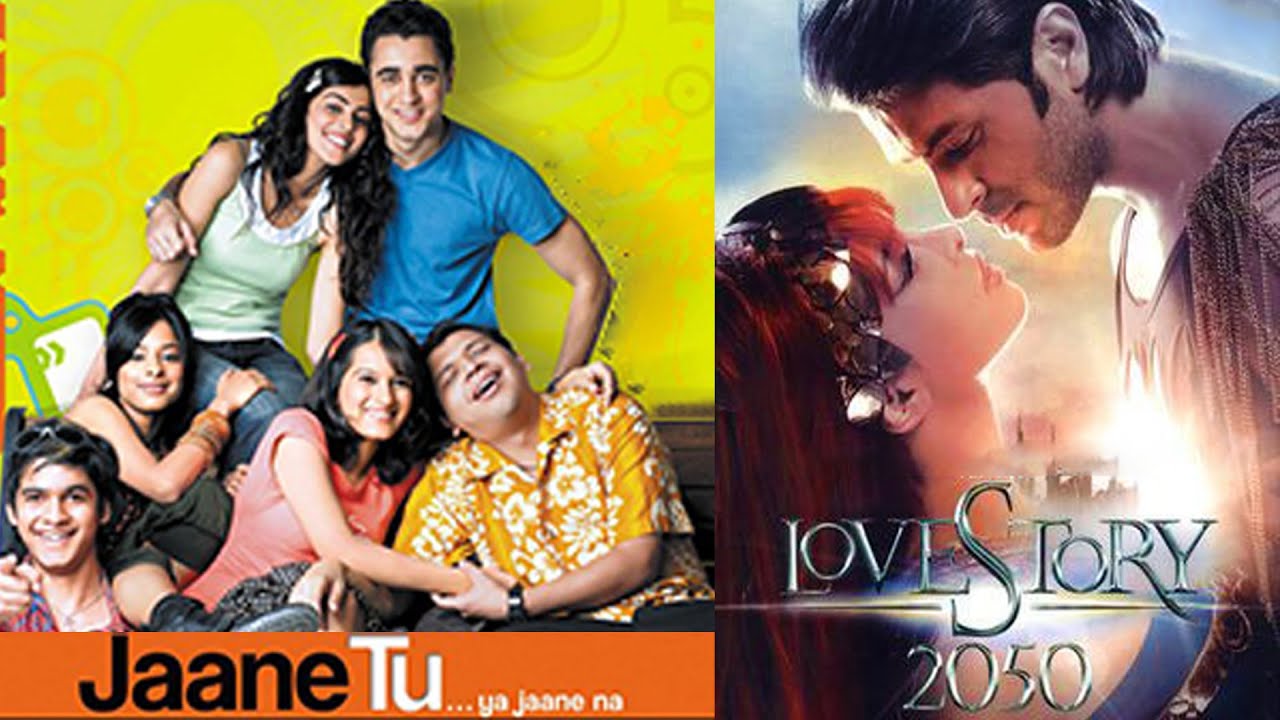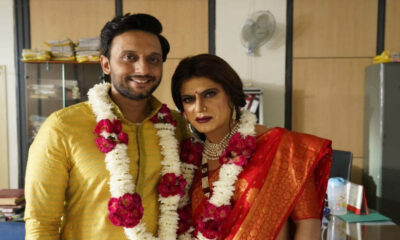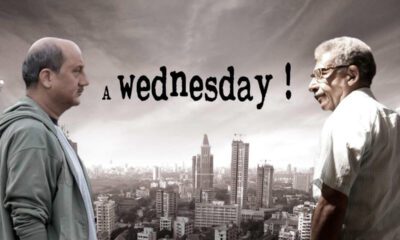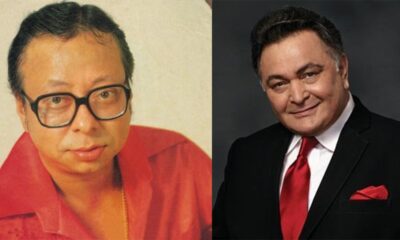Bollywood News
15 Years Of Jaane Tu Ya Jaane Na, Love Story 2050

On July 4,2008 two star kids were launched. One of them Imran Khan became a star, the other Harman Baweja couldn’t quite make it although he displayed ample skills in every department of camera seduction. Baweja recently made a comeback in Hansal Mehta’s webseries Scoop whereas Khan has pretty much withdrawn into oblivion.
Abbas Tyrewala’s directorial debut Jaane Tu…Ya Jaane Na had a certain sparkling spirit , a zest for living life quirk-sized and a certain zing thing about the way the characters look at life and love.It’s not only about the way the characters’ exuberant yearnings connect with the audience. It’s also about the casual free-flowing downloading of events and dialogues in the narrative that give the characters an edge over other urbane youngsters who have come and gone in the past creating a spirit of lingering joie de vivre.
The bunch of collegians here take their cues from Farhan Akhtar’s Dil Chahta Hai, Rakeysh Mehra’s Rang De Basanti and even Karan Johar’s Kuch Kuch Hota Hai. Echoes from these iconic youth -films fill out the outer edges of the ‘cool’ canvas creating for the characters at-hand a sense of wondrous and informal perpetuity as they go from humorous heartbreak to sober selfrealization in a plot that accommodates both impulse and pre-meditated thought in a mix that is engaging endearing and fairly original in spite of the derivative echoes.
While the supporting cast of friends are both real and tangible , at the core of this romantic musical are Jai(Irfan Khan) and Aditi(Genelia) who are “best friends” in the coolest sense of the term. Bantering bum-chums at the surface but sharing a much deeper bond underneath , all their friends can see that the twosome is made for each other.
But they can’t.It’s an exceedingly old formula for a romantic comedy given a fresh new spin by a storyteller who picks on moments from ordinary lives and converts them into a celebration of life and love.
Old songs(R.D Burman mainly) and new original music(A .R Rahman) coalesce with the minum fuss while Jai and Aditi’s love story goes through several turns and twists until they arrive at that traditional end-game for romantic films: the grand reunion at the airport seconds before the girl is scheduled to take off for good.
The flurry is charming ,though a little to selfconsciously designed at times.Peep underneath . And you see the narration covering a lot of familiar ground.The freshness lies in the way the characters respond to the familiar material often exceeding the domain created by the script.Every actor pitches in at just the right volume of vivacity. There are stand-out supporting performances by Naseeruddin Shah(playing the hero Jai’s dead father in a portrait), Ratna Pathak(superbly skilled as Jai’s mom), Paresh Rawal( flawless as a boorish cop) and Arbaaz and Sohail Khan(as a couple of outlandish cowboys they supplant the believably urbane love story with a touch of the surreal).
Then there’s Manjari Phadnis as the hero’s could-be love interest. Living in perpetual denial she thinks her embittered parents(Rajat Kapoor and Kitu Gidwani) actually love each other under the acrimony.The characters never claim to be extraordinary in their desires. It’s their ordinary dreams and down-to-earth desires which give the narration a spirited spin.
And then there are protagonists. Not just young Imran Khan and Genelia. But their friends. Each one played as though the wall dividing the actor from the characters had disappeared.While Genelia is a natural in most scenes, Imran’s unassuming boy-next-door personality lends itself with picture-perfect precision to the mood and tenor of the narration.
Jaane Tu Ya Jaane Na exudes an urbane cool. It’s not really trying to be anything. It doesn’t have an earthshattering message for the masses.
What it has is an honest story about a bunch of credible characters told in a fashion that’s casually trendy and warm. Manoj Lobo’s cinematography and Shan Mohamed’s editing assist the director in making this a film that you’d probably like to watch again just to see if you missed out a vital bit of the characters’ lives while they were looking for love.
Significantly director Abbas Tyrewallah directed another film Jhoota Hi Sahi which flopped miserably.
After watching Harman Baweja sing, dance, emote and entertain in Love Story 2015 directed by his father Harry Baweja, for a full three hours, one wondered if there is anything that this Baweja boy from Bollywood can’t do.
Yes, maybe there is something Harman can’t do. He can’t make us forget for even a minute that he knows every component of the camera although he has never acted before. The confidence level stops just short of being cocky and overdone. He is never short of a positive and productive attitude.
It is clear that producer-director Harry Baweja made “Love Story 2050” as a showcase for his son’s aptitudes. To that extent, the film works wonderfully, creating repeated opportunities for the debutant to shine.
The script – sprawling across two time phases and three hours of playing time – is a simple love story of two very good looking people coming together in the svelte, sweltering, simmering climes of Sydney, moving apart and then going into a futuristic mode without alienating themselves from the romantic genre that this uniquely-designed film inhabits.
Harry Baweja happily avoids the pitfalls of pedestrianism even when the boy-meets-girl plot gets into a trite and repeatedly-tested mode.The protagonists share a precious, fragile and tender chemistry. A butterfly perches itself on the girl’s trembling hands and manoeuvres her heart into places where there’re no tell-tale signs. The butterfly becomes a likeable leitmotif in the plot. The courtship and romance is done in shades and words that leave us smiling. The initial scenes are actually far more interesting than they appear.
The boy tells the girl to do something that she has never done before. How about shop-lifting? He suggests. She suggests he recite some poetry for her. Javed Akhtar does the rest.
By the time Harman and Priyanka sing their first two duets we’re convinced that they care deeply for each other. It’s in their eyes. No kisses and cuddles needed. Only cuddly robots. For the first time in a Hindi film, two robots serving as the protagonists’ companions are given prominent places in the plot. And they aren’t just props. They are entities with a mind and personality of their own.
The entire courtship game stretching into two time zones is played out with an endearing innocence, and a focus and finesse that re-define the boy-girl formula in a language that’s sassy and trendy without ever lumbering into the lurid.Towards the second-half, when Harman flies into a futuristic Mumbai to retrieve lost love, the flying cars, the humane robots and the psychedelic dance numbers tend to overpower the basic romantic structure of the plot.
Harry Baweja could have avoided the extravagant excesses in the sky. How long can you watch flying cars and talking robots? After a while you restlessly begin to search for that romantic core which, blessedly, is never too far away from the narrative’s range of interests.The second half, when a zany scientist (Boman Irani in a weird wig and silly smirk) transports the lovers and the audience into the future, has been done with an élan and flamboyance that leave us enthralled.
Vijay Arora’s camera work is extraordinarily rich in colours and style. The same goes for Priyanka’s sartorial grace. Her two characters are brilliantly defined by their clothes. Fortunately, Priyanka goes deeper in search of her characters’ core. The repressed poetic persona in the first half and the brassy red-haired rock star in the second-half are two different entities.
But make no mistake. “Love Story 2050” belongs to debutant Harman from first frame to the last. And all his co-stars know it. They all sort of move back to let the Baweja boy take centrestage.
Harman demonstrates an endearing all-purpose showmanship. He dances like a dream and gets gooey-eyed and sentimental in love scenes. A star was (still)born.








